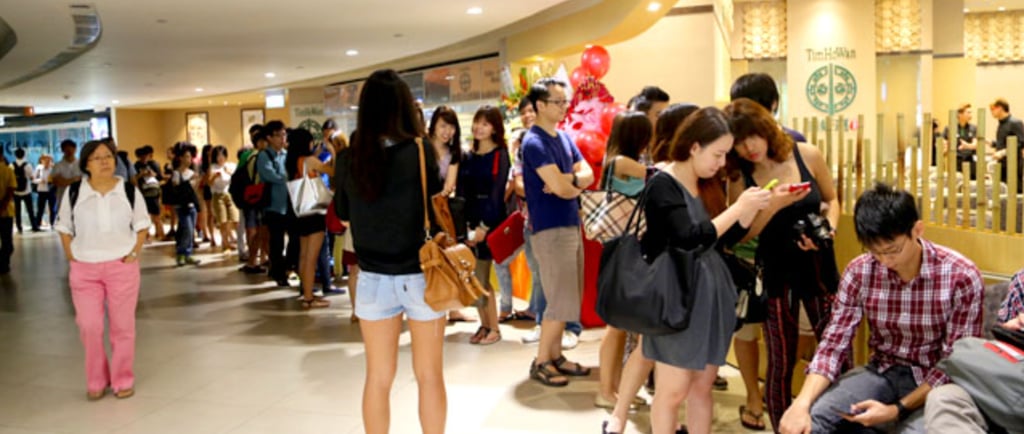Why Singaporeans Love Queueing for Food: The Psychology Behind the Phenomenon
7/28/20253 min read


Why Singaporeans Love Queueing for Food: The Psychology Behind the Phenomenon
Walk through any hawker centre, shopping mall, or food fair in Singapore, and you’re bound to spot one unmistakable sight: a long, snaking queue outside a food stall. Whether it's the latest viral bubble tea joint, a Michelin Bib Gourmand hawker, or an old-school bakery selling nostalgic buns, Singaporeans will wait—sometimes for hours—for a taste. But what’s really behind this phenomenon? Is it simply about good food, or is there a deeper psychological force at play?
Scarcity and Social Proof: “It Must Be Good”
One of the key psychological drivers behind queueing is social proof. In psychology, social proof refers to people copying the actions of others in an attempt to reflect correct behavior. When Singaporeans see a long line outside a stall, the immediate thought is: “It must be worth it.” The queue becomes an unspoken endorsement.
Coupled with this is the scarcity principle. When something is limited—be it time-sensitive, hard to get, or produced in small quantities—it becomes more desirable. A limited-edition croissant that sells out by noon? A bowl of ramen that only 100 people get to try a day? Scarcity triggers FOMO (Fear of Missing Out), and queueing becomes the price of admission to exclusivity.
Cultural Values: Food as a National Identity
In Singapore, food is more than sustenance; it’s a national obsession. It's the default topic in conversations, the centerpiece of celebrations, and a source of pride. Unlike other cultures where sports or politics dominate discussions, Singaporeans bond over food.
This passion is deeply ingrained in the collective identity. The country’s unique multicultural heritage has birthed a diverse culinary scene that Singaporeans take seriously. Queueing, in this context, isn’t just about getting a meal—it’s a shared cultural ritual. You’re not just eating; you’re participating in something meaningful, something uniquely Singaporean.
Delayed Gratification and Reward
There’s also a psychological payoff that comes from delayed gratification. Studies in behavioral psychology show that waiting increases the perceived value of a reward. In the case of food, the longer the wait, the more satisfying the eventual meal feels.
The experience of queueing can also serve as a form of effort justification. If you’ve waited 45 minutes for chicken rice, your brain rationalizes the effort by amplifying the taste experience. That plate isn’t just good—it’s amazing—because you earned it.
Social Media and the Hype Economy
We can’t ignore the role of social media. In the age of Instagram and TikTok, food is as much about appearance and virality as it is about flavor. A queue often signals a “must-try” experience, one worthy of posting online. People queue to be part of the trend, to tick off a food experience from their list, and to show that they were among the chosen few who tasted the latest culinary craze.
This has created what some call the "hype economy," where perception can matter more than product. Sometimes, people join queues without knowing exactly what they're queueing for—just that it must be something. The queue becomes the message.
Trust in the Crowd
In a densely populated, efficiency-driven society like Singapore, trust in the crowd is a shortcut for decision-making. Why take a gamble on a new food stall when the queue tells you what’s tried, tested, and approved by others? It’s an efficient heuristic, especially in places with overwhelming food choices like hawker centres or food courts.
This reliance on communal validation is particularly pronounced in Singapore’s pragmatic culture. If others are willing to queue for it, chances are, it’s worth your time too.
Conclusion: More Than Just Food
At first glance, queueing for food may seem like a quirky national habit, but dig a little deeper and it reveals layers of psychological and cultural meaning. From social proof and scarcity to national identity and delayed gratification, the reasons Singaporeans queue for food are complex and compelling.
In a fast-paced city where time is precious, the willingness to wait in line is a testament to the value placed on good food—and the community that forms around it. Queueing becomes not just a means to an end, but part of the experience itself. In Singapore, the line outside the stall isn’t a deterrent—it’s the invitation.
